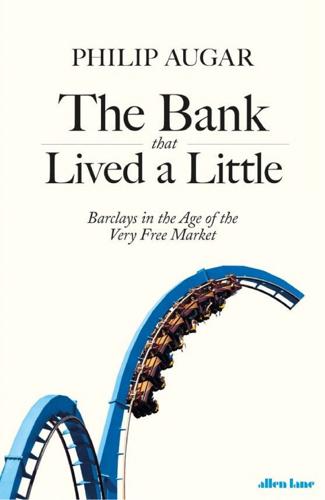
The Bank That Lived a Little: Barclays in the Age of the Very Free Market
by
Philip Augar
Published 4 Jul 2018
Barclays published its first remuneration report under these rules on Monday 7 March just as Sally Bott was starting back there. The five highest senior executives below board level received £38 million in compensation and would be entitled to £10 million more under a long-term incentive plan if certain targets were met. The 231 code staff received £504 million and stood to gain a further £50 million under the long-term incentive plan; in addition, they had £608 million in unvested deferred compensation.3 Under the headline ‘Barclays hands five bankers £110 million’, the Guardian described these figures as ‘astonishing’.4 Bott too felt she needed to understand how such sums had been earned.
…
Show me the real numbers.’ Bott’s story was one of greed gone mad: ‘We are the highest payer on the street. The competitors all say we are driving up pay rates. We are Barclays Capital, not Morgan Stanley. No other bank has a scheme quite like our long-term plan.’ Between 2002 and 2009, Barclays Capital’s long-term incentive plans had paid on average £170 million each year to sixty people on top of their salary and bonus. Over the same period, the Barclays Capital LTIPs paid 80 per cent of the possible maximum, which was set at eight times average earnings. Bott said that the targets were clearly too easy and the cap was too high.
…
The board must be told at the next meeting and Carnwath insisted that Sally brief the non-executives beforehand. That meeting took place in the Lehman building, the scene of many breathtaking pay awards during Fuld’s time. Sally took the non-executives through the remuneration plans, setting out the special deals that various business units had negotiated over the years and the long-term incentive plan. She handed out a spreadsheet listing details of the top twenty-five earners going back five years. She laid out the total amounts that had been paid and the sums that individual executives had earned, name-by-name, year-by-year, just as Carnwath had asked. There was silence when she finished.
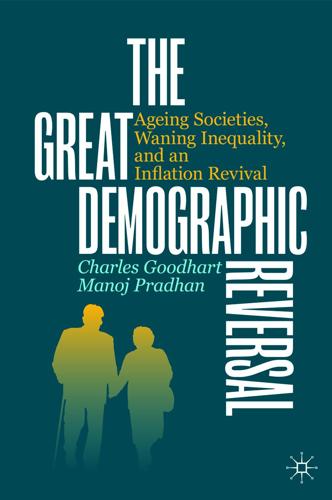
The Great Demographic Reversal: Ageing Societies, Waning Inequality, and an Inflation Revival
by
Charles Goodhart
and
Manoj Pradhan
Published 8 Aug 2020
Charles Goodhart Manoj Pradhan London, UK Abbreviations ACE Allowance for Corporate Equity ADL Activities of Daily Life AE Advanced Economies AEA American Economic Association AFD Alternative for Germany AGM Annual General Meeting AI Artificial Intelligence AIG American International Group BEPS Base Erosion and Profit Shifting BIS Bank of International Settlements BLS Bureau of Labour Statistics BoA Bank of America BoJ Bank of Japan CAR Capital Adequacy Ratio CBI Central Bank Independence CBO Congressional Budget Office CEO Chief Executive Officer CFAS Cognitive Function and Ageing Study CPI Consumer Price Index CSI Cyclically Sensitive Inflation DBCFT Destination-Based Cash Flow Taxation ECB European Central Bank ELB Effective Lower Bound ELSA English Longitudinal Study of Ageing EME Emerging Market Economies EQ Emotional Quotient FDI Foreign Direct Investment FRB Federal Reserve Board FRED Federal Reserve Economic Database FT Financial Times FTSE Financial Times Stock Exchange FX Forex G10 Group of 10 GDP Gross Domestic Product GFC Great Financial Crisis GFCF Gross Fixed Capital Formation GGM General Gaidar Model HH Household HIC High-Income Countries IBC Indian Bankruptcy Code ICE Intercontinental Exchange IMF International Monetary Fund LHS Left Hand Side LMIC Low- and Middle-Income Countries LTI Loan to Income LTIP Long-Term Incentive Plan LTV Loan to Value MAC Migration Advisory Committee METI [Japan] Ministry of Economy, Trade and Industry MFN Most Favoured Nation MITI [Japan] Ministry of International Trade and Industry MMSE Mini-Mental State Examination NAIRU Non-Accelerating Inflation Rate of Unemployment NBER National Bureau of Economic Research NFC Non-Financial Corporation NHS [British] National Health Service NICE Non-Inflationary with Continuous Expansion NLW National Living Wage NRU Natural Rate of Unemployment NUM [UK] National Union of Mineworkers OBR Office for Budget Responsibility OECD Organisation for Economic Cooperation and Development ONS Office for National Statistics O-FDI Outbound Foreign Direct Investment p.a.
…
Diagram 7.5Ratio of remuneration between CEOs and average workers in world in 2014, by country (Source Washington Post, September 25, 2014) Diagram 7.6Median cash incentive payments for FTSE 100 lead executives 1996–2013 (Source High Pay Centre) Pay packages typically include an annual bonus and ‘long-term incentive plan’ (LTIP) on top of base salary. While salary increases have been steady since the late 1990s, performance-related payments have increased dramatically, driving a rapid increase in total pay over the same period. In such circumstances, one might have expected the voting support of those who have lost out relatively during the last three decades to go to left-wing parties in their own countries.
…
Law and Justice, Poland Law clerks Lawson, Nigel League of the North, Italy ‘Left behind’ workers, turning to nativist, populist politicians ‘Left-behind’ voters, supporting right-wing populists Left behind, views of those Left-wing parties Left-wing politicians, idealistic Left-wing politicians, soft on immigration control Left-wing socialists Lehman Brothers Leverage Leverage, increase of Leverage, increasing rapidly Leverage, reduced by corporate sector in Japan Leveraged loan market, growing rapidly Leverage ratio, of banking sector Leverage ratio of banks Levered loans Leviathan Lewis turning point Lex Column Life-cycle, consumption rises over the Life-cycle, differing segments of Life-cycle, now changing shape Life cycle, of population Life-cycle, personal Life-cycle changed Life-cycle hypothesis Life expectancy Life expectancy, increasing Life expectancy, years of after retirement Limited liability Lindé, J. Liu, E. Livingston, G. Loan to Income (LTI) Loan to Value (LTV) Longevity Longevity, rising faster than retirement age Long-term contracts Long-Term Incentive Plan (LTIP) Long-term interest rates, market determined Lost decade Lost decade, in Japan Low-and Middle-Income Countries (LMICs) Lower middle class Low interest rate Low investment LTV ratio M Ma, G. Macroeconomic balance Macron, Emmanuel Macro-prudential regulations Maestas, N.
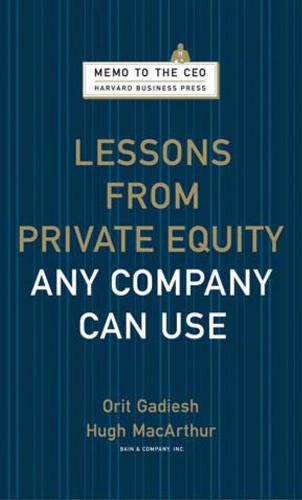
Lessons From Private Equity Any Company Can Use
by
Orit Gadiesh
and
Hugh MacArthur
Published 14 Aug 2008
Many talented managers want both to do the right thing by shareholders and to reap their just rewards. But public companies can also compete for top talent. Nestlé, for example, introduced short-term bonuses, paid out against clearly established targets, increased the variable part of the compensation, and moved fourteen hundred people into long-term incentive plans, so that key managers became shareholders. Beyond the management team, too many companies fail to fully harness the talent of their boards, to make the boards more decisive and efficient in helping CEOs do the performanceenhancing job. Value-added boards help coach CEOs, provide real business input and make quick decisions on corporate requests.
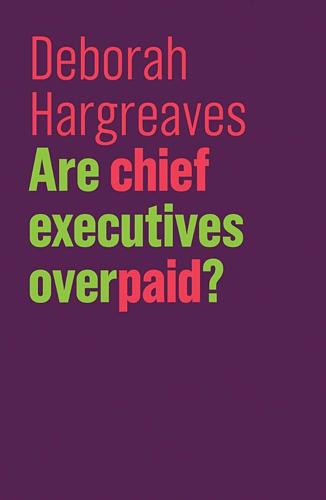
Are Chief Executives Overpaid?
by
Deborah Hargreaves
Published 29 Nov 2018
This is accompanied by a short-term incentive such as an annual bonus paid in either cash or shares. Then comes a medium-term incentive such as deferred or matching shares, whereby the executive gets a share award for meeting certain targets or the company gives him an award of shares that match his own investment. Long-term incentive plans (or LTIPs) have been the big growth area in the past 10 years; these consist of shares, share options or both, running concurrently and usually awarded depending on performance against agreed targets over a three-year period. There is much discussion about whether the LTIPs should be tied to a longer performance period, and some investors now insist on five years.
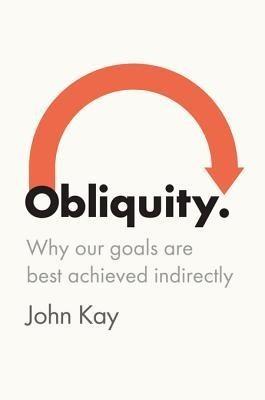
Obliquity: Why Our Goals Are Best Achieved Indirectly
by
John Kay
Published 30 Apr 2010
The stonemason committed to the glory of God will build a better cathedral than the stonemason who is motivated entirely by the bonuses offered and scourges threatened by his employer. The executives, such as Bill Allen, who sought to build great businesses established enduring competitive advantages for their corporations. The executives at Citigroup and Lehman who rewarded themselves with share options and “long-term” incentive plans did not. Chapter 10 COMPLEXITY—How the World Is Too Complex for Directness to Be Direct Computers don’t do obliquity. Computers work through prescribed routines of any degree of complexity in a direct, linear manner with incredible speed and accuracy. Sudoku is an easy problem for a computer, and chess seems not much harder.

Them And Us: Politics, Greed And Inequality - Why We Need A Fair Society
by
Will Hutton
Published 30 Sep 2010
Company remuneration committees ‘aligned shareholder and director interest’ by fixing CEOs’ and directors’ remuneration so that the sole business focus was increasing the share price in both constituencies’ interests. Thus base pay of CEOs in the FTSE 100 has risen from 47 times an average worker’s salary in 2000 to 81 times now, typically with the opportunity for at least a 100 per cent bonus and a long-term incentive plan (LTIP) on top, linked to the performance of the share price.2 As Richard Lambert, director-general of the CBI, said in March 2010, for the first time in history officers of a company can become seriously rich without risking any of their own money. Their rewards are so beyond those of ordinary people that they risk being seen as aliens from another galaxy.3 None of this is now credible, even though many of the practices over pay and business strategy continue as if nothing has happened.
…
INDEX Aberdeen University, 263 ABN AMRO, 150 Abramovitch, Roman, 64, 65, 67 accountancy firms, 296 Acemoglu, Daron, 299 aerospace, 136, 219, 268 Afghanistan, 13, 102, 144, 322 Africa, 71–2, 322, 383, 385 AIG, 152, 175, 176 airline industry, 30, 91, 109, 134, 143 Akerlof, George, 43 Alcoa, 133 alcohol policy, 335 Alessandri, Piergiorgio, 151, 153 Amazon, 253 Anderson, Elizabeth, 79 angels, business, 244, 252 Anglo Irish Bank, 181 Apple Inc., 29–30, 65–6, 71, 253 apprenticeships, 10, 295 Arculus, Sir David, 180 Argentina, 368 Aristotle, 39, 274 ‘arms race’ effects, 105 Arup Group, 66, 67, 93 Asda, 93 Ashcroft, Lord, 344 Ashdown, Paddy, 141 Asian Tiger exports, 149, 208, 355 AT & T, 133–4 Atari, 30 BAA, 8, 257–8 baby boomer generation, 34, 372–3 ‘Baby P’ case, 10, 325–6 Bagehot, Walter, 156–7 Bailey, Bob, 16, 25 Baker, Kenneth, 276 Baldacci, Emanuele, 367 Baldwin, Stanley, 315 Balls, Ed, 138, 147, 338 Bank of America, 152, 158, 175, 192 Bank of England, 4, 7–8, 129, 148, 180, 208, 250, 339, 359; lender-of-last-resort function, 157, 158, 160; Monetary Policy Committee, 185, 186, 264; reserve requirements scrapped (1979), 161, 208 Bank of International Settlements (BIS), 169, 182 Bank of Scotland, 186, 251 bankers, 4–5, 25–6, 62, 63–4, 180, 188; errors that caused the crash, 188–96, 197–204; gambling culture, 7, 8; pay see pay of executives and bankers Bankers Trust (New York), 140, 167 banking and banks: see also under entries for individual organisations; bail-out of, 3, 7–8, 19, 24, 138, 152–3, 172, 175, 176, 181, 204–5, 210, 389, 392; balance sheets, 7, 160, 164, 165, 191, 208, 210; bank runs, 9, 156–7, 158, 175–6, 202; borrow short and lend long principle, 154, 155–6, 157, 158–9; capital ratios, 151, 158, 162–3, 169, 170, 207, 208; credit-rating agencies and, 151, 196, 207; deposit insurance and, 158, 160; diversification, 154–5, 157, 165, 199, 354; fairness/desert and, 64, 206–7; interbank money markets, 164, 170, 176, 187–8, 202, 204; investment banks, 6, 28, 42, 101, 103, 150–1, 158, 165, 166, 170, 172–6, 195–6, 207; maturity transformation, 155–6, 157, 158–9; need for network of specialist banks, 251–2, 265, 371; nineteenth-century collapses, 156–7; post-crunch deleverage pressures, 359; principles and strategies, 154–6, 157; regulation of see regulation; relationship finance, 244, 251–2, 256–7; remoteness of management, 173–4; required reforms of, 205–10, 251–2, 371; short-term structure of lending, 33; banking and banks – continued socially vital role of, 155, 157; subsidiaries and special purpose vehicles, 181; unproductive entrepreneurship and, 28, 101, 103; vast assets/loans/profits, 32, 138, 147, 170, 172, 201; zero loyalty of front-line staff, 174 Barclay brothers, 327 Barclays, 24, 176, 177–8, 181, 215, 296, 363 Barker, Kate, 185 Basel system, 158, 160, 163, 169, 170–1, 196, 385 Baumol, William, 101, 111, 116, 253, 256 Bayerische Landesbank, 196 Bear Stearns, 150, 152, 158–9, 166, 173–4, 187 Bebchuk, Lucian, 198 Becht, Bart, 82–3 Beckwith, John Lionel, 179 behavioural psychology, 44, 47–50, 59–61 Bekar, Clifford, 108, 263 Bell, Alexander Graham, 221 Ben & Jerry’s, 266 Benz, Matthias, 86 Berlusconi, Silvio, 317, 328 Bettelheim, Bruno, 86 Better Government Initiative, 313, 336–7 Better Regulation Task Force, 180 Bhagwati, Jagwad, 163 Big Bang (1986), 90, 162 bin Mahfouz, Khalid Salim, 333 biotechnology, 109, 229, 240, 263, 268 Birt, John, 324 Bischoff Inquiry, 178 BISTRO (broad index secured trust offering), 169, 170, 196 Black, Fisher, 191 Blair, Tony, 5, 17, 138, 141–3, 144, 148–9, 276–7, 313, 328, 342; centralisation of power, 14–15, 313, 334, 337, 341; Iraq War and, 14, 36, 144; Rupert Murdoch and, 318; neo-conservative economics and, 388; ‘third-way’ as enthronement of resignation, 389–90; welfare reforms, 81 Blanchflower, Danny, 264–5 Blanden, Jo, 283–4 Blankfein, Lloyd, 42, 63, 168 BMW, 91 Boeing, 136, 256 Bologna University, 261 Born, Brooksley, 182–3 Bowen, Jeremy, 323 Boyle, Susan, 314 BP, 216–17, 392 Branson, Richard, 30 Brazil, 354–5, 385 Bretton Woods system, 159 Brinkley, Ian, 233 Briscoe, Simon, 294 Bristol University, 263 British Airways (BA), 30, 91 British Broadcasting Company (BBC), 321, 322, 323, 329, 330–1, 350, 389 British National Party (BNP), 16, 24–5, 82 Britishness, 15–16, 124, 392–3, 395 Brompton folding bicycle, 103, 105 Brooks, Clem, 281, 282 Brown, Gordon, 5, 12, 141, 178, 302, 314, 328; centralisation of power, 14, 334, 337, 341; as Chancellor, 138, 143, 145–8, 215, 245; deal with Blair (1994), 148; Gillian Duffy blunder by, 394; general election (2010) and, 20, 378, 394; neo-conservative economics and, 144–8, 388; as visionless, 391; Where There is Greed: Margaret Thatcher and the Betrayal of Britain’s Future (1989), 144 Browne, John, 216 Brunel, Isambard Kingdom, 126 Buffett, Warren, 116, 173, 222 Building Schools for the Future programme, 371 building societies, demutualisation of, 156, 186 Buiter, Wilhelm, 172 Burrows, Paul, 59 Buscombe, Baroness, 332 Bush, George W., 17, 36, 135, 177 Cabinet Office, 218–19, 336, 337 Cable, Vincent, 220 Cambridge University, 9, 363 Cameron, David, 20, 179, 233–4, 235, 318, 338, 342; ‘Big Society’ policy, 19–20, 234, 271, 280 Campbell, Alastair, 141, 142, 224, 312 Canada, 121, 354, 358–9, 383 capital controls, abolition of, 32, 161 capitalism: see also entrepreneurs; innovation; amorality of, 16–19; ‘arms race’ effects, 105; boom and bust cycle, 181–7, 392; deregulation (from 1970s), 159–63, 388; fairness and, ix, x, 23–7, 41, 106, 122–3, 206–7, 210, 249, 385, 386, 394; as immutable force of nature, ix, 23, 40–2; incumbent firms, 29–30, 31, 105, 106, 110, 111–12, 253–5, 257, 297; interconnectedness of markets, 200–2, 204; knowledge-entrepreneurship dynamic, 27–8, 31, 103, 110–11, 112–13; liquidity as totemic, 199, 200, 202, 240, 243; need for ‘circuit breakers’, 197, 199, 202, 203; network theory and, 199–204, 206; required reforms of, 205–9, 215–16; stakeholder, x, 148–9; undue influence of, 32–3 Carlaw, Kenneth, 108, 263 Carnegie, Andrew, 195, 303 cars, motor, 91, 108, 109, 134, 269 Castells, Manuel, 317 Cayne, Jimmy, 173–4 CCTV cameras, 10 celebrity culture, 282, 314 central banks, 154, 157, 158, 160, 182, 185, 187, 208; see also Bank of England; Federal Reserve, 169–70, 176, 177, 183 Cerberus Capital Management, 177 Cervantes, Miguel de, 274 Channel 4, 330, 350 Charles I, King of England, 124–5 Charter One Financial, 150 chavs, mockery of, 25, 83, 272, 286–8 child poverty, 12, 21, 74–5, 83, 278, 279, 288–90, 291 China, x, 101, 112, 140, 144, 160, 226, 230, 354–5, 385; consumption levels, 375–6, 379, 380, 381; economic conflict with USA, 376–7, 378–80, 381, 382, 383; export led growth, 36, 169, 208, 226, 355–6, 375–7, 379–81, 382–3; rigged exchange rates, 36, 169, 355, 377, 378–9; surpluses of capital and, 149, 154, 169, 171, 208, 226, 375; unfairness of world system and, 383, 385 Christianity, 53, 54, 352, 353 Church of England, 128 Churchill, Winston, 138, 273, 313 Churchill Insurance, 150 Cisco, 253 Citigroup, 152, 158, 172, 177, 184, 202, 203, 242, 247 city academies, 278, 307 City of London, 34, 137, 138, 178–9, 252, 359; as incumbent elite, 14, 26, 31, 32–3, 210, 249, 355; in late nineteenth-century, 128–30; light-touch regulation of, 5, 32, 138, 145, 146–7, 151, 162, 187, 198–9; New Labour and, x–xi, 5, 19, 22, 142, 144–5, 355; remuneration levels see pay of executives and bankers civic engagement, 86, 313 civil service, 13, 221, 273, 312, 343 Clasper, Mike, 178 Clayton Act (USA, 1914), 133 Clegg, Nick, 22, 218, 318, 327–8, 342, 391 Clifton, Pete, 321 Clinton, Bill, 140, 177, 183 coalition government (from May 2010), 14, 20, 22, 37, 307, 311, 343, 346, 390–2; abolition of child trust fund, 302; capital spending cuts, 370–1; deficit reduction programme, xi, 19, 34, 214, 227, 357, 360–1, 364, 369–71, 373, 390–2; emergency budget (June 2010), 369–70; market fundamentalism and, 370; political reform commitment, 35, 341, 343–4, 346, 350, 390, 391; proposed financial reforms, 208, 209, 245, 252, 371; repudiation of Keynesian economics, xi, 390–1 Cohan, William, 158–9 Cohen, Ronald, 12, 245 collapse/crash of financial system, x, xi, 4, 9, 41, 144, 146, 152–4, 158–9, 168; costs of, 7, 19, 138, 152–3, 172, 214–15; errors responsible for, 136, 187–96, 197–204; global interconnectedness, 375, 382–3; lessening of internationalism following, 376–83; need to learn from/understand, 36–7; predictions/warnings of, 148, 153, 180, 182–5; recommended policy responses, 215–16; results of previous credit crunches, 358, 359–60, 361–2 collateralised debt obligations (CDOs), 155, 167–8, 174 colonialism, 109, 124 Commodity Future Trading Commission, 182–3 communism, collapse of in Eastern Europe, 16, 19, 135, 140, 163 competition, 29, 30, 33, 51, 156, 185, 186, 207–8, 251; see also ‘open-access societies’; City of London and, 160, 178, 179, 198–9; deregulated banking and, 160, 161, 163, 164, 178, 179, 181; European Union and, 251, 258, 259; fairness and, 89–90, 99, 272; incumbent elites/oligarchs and, 104, 114, 129–30, 131–4, 257; innovation and, 40, 114, 257–60; national authorities/regimes, 201–2, 257–60, 316, 318; state facilitation of, 31 Competition Commission, 257–8 computer games, 233 Confederation of British Industry (CBI), 4, 6–7 Conservative Party, xi, 5, 11, 14, 97–8, 220, 343, 378; broken Britain claims, 16, 227, 271; budget deficit and, 19, 224, 357, 360–1, 368, 379; City/private sector funding of, 179, 257, 344; decline of class-based politics, 341; deregulation and, 32, 160, 161; fairness and, 83, 302, 374, 390; general election (1992) and, 140–1; general election (2010) and, 20, 97, 227, 234, 271, 357, 374, 379, 390; Conservative Party – continued government policies (1979-97), 32, 81, 275–6, 290; inheritance/wealth taxes and, 74, 302–3; market fundamentalism and, 5, 17, 138, 147, 160, 161; poverty and, 21, 279; reduced/small state policy, 20, 22, 233–4, 235 construction industry, 5, 33, 268 consumer goods, types of, 266–7 Continental Illinois collapse, 152, 162 Convention on Modern Liberty, 340 Cook, Robin, 142 Cootner, Paul, 194–5 Copenhagen climate change talks (2009), 226, 231, 385 Corporate Leadership Council, US, 93 Corzine, Jon, 177 county markets, pre-twentieth-century, 90 Coutts, Ken, 363 Cowell, Simon, 314, 315 ‘creative destruction’ process, 111, 112, 134 creative industries, 11, 71, 355 credit cards, 64, 354 credit crunch: see collapse/crash of financial system credit default swaps, 151, 152, 166–8, 170, 171, 175, 176, 191, 203, 207 Crédit Lyonnais collapse, 152 credit-rating agencies, 151, 165, 175, 196, 197, 248, 269, 362, 388; funding of, 151, 196, 207 criminal activity/allegations, 7, 101, 103, 104–5, 138, 167–8 Crosby, James, 178 Cuba, 61 culture, British, 12, 187, 282, 314 Dacre, Paul, 324, 326, 329 Daily Mail, 218, 286, 288, 315, 324, 325–7, 339, 342 Daily Telegraph, 288, 317, 319, 327 Darling, Alistair, 149, 204, 252 Darwin, Charles, 31 Data Monitor, 186 Davies, Howard, 198 Davies, Nick, Flat Earth News, 319, 321, 323–4, 326, 331–2 de Gaulle, Charles, 65 debt, 33, 155, 209, 351–63; corporate/commercial, 8, 29, 181, 245, 248, 352, 354, 359, 363, 374; moral attitudes towards, 351–4, 357, 360–1; necessity of, 155, 351, 353, 354; private, 5, 186, 187, 210, 226, 279–80, 354–7, 359, 363, 373; public, 9, 34, 164, 166, 167, 182, 203, 214, 224–6, 356–7, 362–3, 375, 388, 393; sustainable level of, 356–7, 368–9 Defence Advanced Research Projects Agency (DARPA), 265 defence and armed forces, 34, 372 deficit, public, 4, 34, 213, 224–6, 335, 364–74; coalition’s reduction programme, xi, 19, 34, 214, 227, 357, 360–1, 364, 369–71, 373, 390–2, 393; need for fiscal policy, 224–5, 226, 357–8, 364, 365–9, 370, 374; speed of reduction of, 213, 224–5, 360–1, 368, 371 Delingpole, James, 287 Delong, Brad, 27, 106 democracy, 13–15, 235, 310–16, 333–48; centralisation of power and, 14–15, 35, 217, 313, 334, 337, 342; fair process and, 86, 89, 96–9; incumbent elites and, 35, 99; industrial revolution and, 128; media undermining of, 315–16, 317–18, 321–9, 333, 350; ‘open-access societies’ and, 136, 314 Democratic Party, US, 18, 140, 183, 379 Demos, 289 Deng Xiao Ping, 140 Denham, John, 21 deprivation and disadvantage, 10, 34, 288–93, 307–8, 393; low-earning households, 11–12, 13, 291, 361; weight of babies and, 13; young children and, 74–5, 83, 288–90 derivatives, 140, 145, 150–1, 164–8, 171, 175, 188, 207, 209; City of London and, 32, 137, 150–1, 157, 199; mathematical models (‘quants’) and, 188, 191; regulation and, 183, 197–8, 199 desert, due, concept of, 4, 24, 38–43, 45–7, 50–63, 64–8, 73–7, 80–2, 223, 395; see also effort, discretionary; proportionality; big finance and, 40–2, 82, 167, 174, 176, 210; debt and, 351–2; diplomacy/international relations and, 385–6; Enlightenment notions of, 53–6, 58–9, 112; luck and, 70, 73–7, 273; poverty relief systems and, 80–2, 277–8; productive entrepreneurship and, 102–3, 105–6, 112, 222, 392–3; taxation and, 40, 220, 266 Deutsche Bank, 170 developing countries, 71–2, 160, 354–5, 375, 376, 385 Diamond, Bob, 24 Dickens, Charles, 353 digitalisation, 34, 231, 320, 349, 350 Doepke, Matthias, 115–16 dot.com bubble, 9, 193 Drugs Advisory Panel, 11 Duffy, Gillian, 394 Durham University, 263 Dworkin, Ronald, 70 Dyson, James, 28, 33 East India Company, 130 Easyjet, 28, 233 eBay, 136 economic theory, 43–4, 188–9, 366; see also Keynesian economics; market fundamentalism economies of scale, 130–1, 254–5, 258 The Economist, 326, 330, 349 economy, British: see also capitalism; financial system, British; annual consumption levels, 375; balance of payments, 363–4; as ‘big firm’ economy, 254; change in landscape of trading partners, 230–1; coalition capital spending cuts, 370–1; collapse of tax base, 224, 368; cumulative loss of output caused by crash, 138, 153, 172, 214–15; desired level of state involvement, 234–5; domination of market fundamentalism, 16–17; economic boom, 3–4, 5–6, 12, 143, 173, 181–7, 244–5; fall in volatility, 365; fiscal deficit, 368; fiscal policy, 208, 224–5, 226, 357–8, 364–9, 370, 374; growth and, 9–10, 214–15, 218–19, 224, 359, 363; inefficient public spending, 335; investment in ‘intangibles’, 232–3; in late nineteenth-century, 128–30; ‘leading-edge’ sectors, 218–19; need for engaged long term ownership, 240–4, 249–51; as non-saver, 36, 354; potential new markets/opportunities, 231–3; public-private sector interdependence and, 219–22, 229–30, 261, 265–6, 391, 392; required reforms of, 20, 239–44, 249–52, 264–6, 371–4 see also national ecosystem of innovation; ‘specialising sectors’, 219; urgent need for reform, 36–7; volatility of, 297–8; vulnerability of after credit crunch, 358–64 economy, world: acute shortfall of demand, 375–6; Asian and/or OPEC capital surpluses and, 149, 153–4, 169, 171, 208, 226, 354, 375; conflicts of interest and, 137, 138; deregulation (from 1970s), 159–63; emerging powers’ attitudes to, 226; entrenched elites and, 137–8, 210; fall in volatility, 365; international institutions as unfair, 383, 385; London/New York axis, 149, 150–1, 157–8, 160, 187, 202; need for international cooperation, 357–8, 379–80, 381–3, 384, 385–6; post-crunch deleverage pressures, 359–60, 374–5; protectionism dangers, 36, 358, 376–7, 378, 379, 382, 386; savers/non-savers imbalance, 36, 169, 208, 222, 355, 356, 375–6, 378–83; shift of wealth from West to East, 36, 383–4; sovereign debt crises, 167, 203, 214; unheeded warnings, 182–5; wrecking of European ERM, 140, 144 Edinburgh University, 145 education, 10, 20–1, 128, 131, 272–4, 276, 278, 292–5, 304–8, 343; Building Schools for the Future programme, 371; cognitive and mental skills, 288–90, 304–6; private, 13, 114, 264–5, 272–3, 276, 283–4, 293–5, 304, 306 effort, discretionary, 50, 53, 54–5, 58–60, 80, 90–1, 114, 134; see also desert, due, concept of; fair process and, 91–4; indispensability and, 65–7; innovation and invention, 62, 65, 102–3, 105–6, 112, 117, 131, 223, 262–3, 392–3; luck and, 26–7, 65, 67, 70, 71, 73–4, 75–7; productive/unproductive, 43, 46–7, 51–2, 62, 64–5, 102–3, 392–3; proportionate reward for, 26, 39–40, 44, 47, 61, 74, 76–7, 84, 122, 272, 273, 2 84 egalitarianism, 27, 53–4, 55–6, 61, 75, 78–80, 144, 341, 343; Enlightenment equal worth concept, 53, 55, 59–60 Ehrenfeld, Rachel, 333 Eisman, Steve, 207 electoral politics: see also general election (6 May 2010); general elections, 97, 138, 277, 315; fair process and, 96–9; franchise, 128; general election (1992), x, 138, 140–1, 144, 148, 277; general election (1997), x, 138, 141 electricity, 134, 228, 256 electronic trading, 105 elites, incumbent, 23, 31–3, 99, 131; City of London, 14, 26, 31, 32–3, 210, 249, 355; competition and, 104, 113, 114, 129–30, 131–4, 257; democracy and, 35, 99; Enlightenment and, 122; history of (from 1880s), 131–4; history of in Britain (to 1900), 124–30; innovation and, 29–30, 110, 111–12, 113, 114, 115, 116; modern big finance and, 135, 137–8, 180, 210, 387–9; in ‘natural states’, 111, 113, 114–15, 116, 123–4, 127; New Labour’s failure to challenge, x–xi, 14, 22, 388, 389–90; world economy and, 137–8, 210 EMI, 28, 247, 248 employment and unemployment, 6, 75, 291–3, 295, 300, 373, 393; employment insurance concept, 298–9, 301, 374; lifelong learning schemes, 300, 301; lifelong savings plans, 300; unemployment benefit, 81, 281 Engels, Friedrich, 121–2 English language as lingua franca, 124 Enlightenment, European, 22, 30–1, 146, 261, 314–15; economics and, 104, 108–9, 116–17, 121–3; notions of fairness/desert, 53–6, 58–9, 112, 122–3, 394; science and technology and, 31, 108–9, 112–13, 116–17, 121, 126–7 Enron affair, 147 entrepreneurs: see also innovation; productive entrepreneurship; capitalist knowledge dynamic, 27–8, 31, 110–11, 112–13; challenges of the status quo, 29–30; Conservative reforms (1979-97) and, 275; private capital and, 241; public-private sector interdependence and, 219–22, 229–30, 261, 265–6, 391, 392; rent-seeking and, 61–2, 63, 78, 84, 101, 105, 112, 113–14, 116, 129, 135, 180; unproductive, 28–9, 33, 61–2, 63, 78, 84, 101–2, 103–5, 180 environmental issues, 35–6, 71–2, 102, 226, 228, 231, 236, 385, 390, 394; due desert and, 68; German Greens and, 269 Erie Railroad Company, 133 Essex County Council, 325, 332 European Commission, 298 European Exchange Rate Mechanism (ERM), 140, 144, 166 European Union (EU), 11, 82, 179, 379–80, 383–4, 385; British media and, 15, 328, 378; Competition Commissioner, 251, 258, 259; scepticism towards, 15, 36, 328, 377, 378, 386 eurozone, 377 Fabian Society, 302–3 factory system, 126 fairness: see also desert, due, concept of; proportionality; abuse/playing of system and, 24–5, 27; asset fairness proposals, 301–3, 304; behavioural psychology and, 44, 47–50, 59–61; Blair’s conservative view of, 143; Britishness and, 15–16, 392–3, 395; capitalism and, ix, x, 23–7, 41, 106, 122–3, 206–7, 210, 249, 385, 386, 394; challenges to political left, 78–83; coalition government (from May 2010) and, 22, 37; commonly held attitudes, 44, 45–7; deficit reduction and, 226, 227, 374; economic and social determinism and, 56–8; Enlightenment notions of, 53–6, 58–9, 112, 122–3, 394; fair process, 84–94, 96, 98–9, 272; as foundation of morality, 24, 26, 45, 50; individual responsibility and, 39, 78–9; inequality in Britain, 78, 80, 275–6, 277–8, 342; international relations and, 226, 385–6; ‘Just World Delusion’, 83; luck and, 72–7; management-employee relationships, 90–2; models/frameworks of, 43–58; need for shared understanding of, 25, 37, 43; partisanship about, 42–3; politicians/political parties and, 22, 83, 271–2, 302–3, 374, 391–2; popular support for NHS and, 75, 77, 283; pre-Enlightenment notions, 52–3; shared capitalism and, 66, 92–3; state facilitation of, ix–x, 391–2, 394–5; welfare benefits to migrants and, 81–2, 282, 283, 284 Farnborough Sixth Form College, 294 Federal Reserve, 169–70, 176, 177, 183 Fees Act (1891), 128 Fertile Crescent, 106 feudalism, European, 53–4, 74, 104, 105 financial instruments, 103, 148, 157, 167–8 Financial Services and Markets Act (2001), 198 Financial Services Authority (FSA), 24, 147, 162, 178, 198–9, 208 financial system, British: see also capitalism; economy, British; Asian and/or OPEC capital surpluses and, 149, 154, 354; big finance as entrenched elite, 136, 137–8, 176, 178–80, 210, 387–9; declining support for entrepreneurship, 241; deregulation (1971), 161; fees and commissions, 33; importance of liquidity, 240, 243; lack of data on, 241; London/New York axis, 149, 150–1, 157–8, 160, 187, 202; massive growth of, 137, 138, 209, 219; need for tax reform, 209–10; regulation and see regulation; required reforms to companies, 249–50; savings institutions’ share holdings, 240–1; short termism of markets, 241, 242–3; unfairness of, 138, 210 Financial Times, 12, 149, 294, 330, 349, 361 Fink, Stanley, 179 fiscal policy, 208, 224–5, 226, 357–8, 364–9, 374; coalition rejection of, 370 fish stocks, conservation of, 394 Fitch (credit-rating agencies), 248 flexicurity social system, 299–301, 304, 374 Forbes’ annual list, 30 Ford, Henry, 195, 302 foreign exchange markets, 32, 161, 164, 165, 168, 363, 367; China’s rigged exchange rate, 36, 169, 355, 377, 378–9; currency options, 166, 191; eurozone, 377 foreign takeovers of British firms, 8, 388 Fortune magazine, 94 Foster, Sir Christopher, 313 foundation schools, 307 France, 51–2, 123–4, 163, 372, 375, 377 free trade, 163, 334, 379 Frey, Bruno, 60, 86 Friedman, Benjamin, 282–3 Fukuyama, Francis, 140 Fuld, Dick, 192 Future Jobs Fund, 373 G20 countries, 209, 358, 368, 374 Galliano, John, 143 Gardner, Howard, 274, 305–6 gated communities, 13 Gates, Bill, 71 Gates, Bill (Senior), 222 Gaussian distribution, 190–1, 194 ‘gearing’, 6 general election (6 May 2010), 97, 142, 179, 214, 217, 227, 234, 271, 314, 318, 327–8, 334, 378; Gillian Duffy incident, 394; result of, xi, 20, 345–6, 390 ‘generalised autoregressive conditional heteroskedasicity’ (GARCH), 194 genetically modified crops, 232 Germany, 36, 63, 244, 262, 269, 375–6, 379, 380; export led growth, 355–6, 375, 381–2; Fraunhofer Institutes, 252, 264; Greek bail-out and, 377; pre-1945 period, 128, 129, 134, 382, 383 Gieve, Sir John, 339–40 Gilligan, Andrew, 329 Gladwell, Malcolm, 76–7 Glasgow University, 323 Glass-Steagall Act, 162, 170, 202–3 Glastonbury festival, 143 globalisation, 32, 98, 140, 143, 144, 153–4, 163, 182, 297, 363, 366, 380 Goldman Sachs, 42, 63, 103, 150, 167–8, 174, 176, 177, 205 Goodwin, Sir Fred, 7, 150, 176, 340 Google, 131, 136, 253, 255, 258, 262 Goolsbee, Austin, 52 Gorbachev, Mikhail, 140 Gough, Ian, 79 Gould, Jay, 133 Gould, Philip, 142 government: see also democracy; political system, British; cabinet government, 312, 334, 337; centralisation of power, 14–15, 35, 217, 313, 334, 337, 341, 342; control of news agenda, 14, 224, 313; disregard of House of Commons, 14–15, 223, 339, 345; Number 10 Downing Street as new royal court, 14, 337, 338, 346, 347; press officers/secretaries, 14, 180, 224, 312; Prime Ministerial power, 337, 344, 345, 346 GPS navigation systems, 233, 265 Gray, Elisha, 221 Great Depression, 159, 162, 205, 362 Greece: classical, 25, 26, 38, 39, 44–5, 52–3, 59, 96, 107, 108; crisis and bail-out (2010), 167, 371, 377, 378 Green, Sir Philip, 12, 29, 33 Green Investment Bank, proposed, 252, 371 Greenhead College, Huddersfield, 294 Greenspan, Alan, 145–6, 165, 177, 183, 184, 197–8 Gregory, James, 277 growth, economic: Britain and, 9–10, 214–15, 219, 221, 359, 364; education and, 305–6; export led growth, 36, 169, 208, 226, 355–6, 375–7, 378–83; social investment and, 280–1 GSK, 219, 254 the Guardian, 319, 330, 349 Gupta, Sanjeev, 367 Gutenberg, Johannes, 110–11 Habsburg Empire, 127 Haines, Joe, 312 Haji-Ioannous, Stelios, 28 Haldane, Andrew, 8, 151, 153, 193, 214, 215 the Halifax, 186, 251 Hamilton, Lewis, 64, 65 Hammersmith and Fulham, Borough of, 167 Hampton, Sir Philip, 173 Hands, Guy, 28, 178, 246–8 Hanley, Lynsey, 291, 293, 302 Hanushek, Eric, 305–6 Hart, Betty, 289 Harvard University, 47, 62, 198 Hashimoto administration in Japan, 362 Hastings, Max, 217–18 Hauser, Marc, 47–50 Hawley, Michael, 65–6 Hayward, Tony, 216–17 HBOS, 157, 158, 178, 251 health and well-being, 9, 75, 77, 106, 232, 233, 290–1; see also National Health Service (NHS) Heckman, James, 290 hedge funds, 6, 21, 103, 157–8, 167–8, 172, 203, 205, 206, 240; collapses of, 152, 173–4, 187, 202; as destabilisers, 166–7, 168; destruction of ERM, 140, 144, 166; near collapse of LTCM, 169–70, 183, 193, 200–1 hedging, 164, 165–6 Heinz, Henry John, 302 Hermes fund management company, 242 Herrman, Edwina, 179 Herstatt Bank collapse, 152 Hetherington, Mark, 84 Hewitt, Patricia, 180 Hewlett-Packard, 30 Hills Report on social housing, 290 Hilton, Paris, 304 Himmelfarb, Gertrude, 146 Hirst, Damien, 12 history, economic, 121–36, 166, 285–6, 353–4 Hobhouse, Leonard, 220, 222, 234, 235, 261, 266 Hobsbawm, Eric, 100 Hoffman, Elizabeth, 60 Holland, 113, 124, 230 Honda, 91, 269 Hong Kong, 168 Hopkins, Harry, 300 Horton, Tim, 277 House of Commons, 14–15, 223, 312–13, 337–9, 345 House of Lords, 15, 128, 129, 312, 334, 344, 346–7 housing, social, 10, 289, 290–1, 292, 308–9 housing cost credits, 308–9 HSBC, 181, 251 Huhne, Chris, 346 Hunt family, sale of cattle herds, 201 Hurka, Thomas, 45–6 Hutton, Will, works of, x; The State We’re In, x, 148–9 IBM, 29, 164, 254 Iceland, 7, 138 ICT industry, 9, 29–30, 109, 134, 135–6, 182, 229 immigration, 11, 143, 326, 328, 342, 343, 386, 394; from Eastern Europe, 82, 281–2, 283; welfare state and, 81–2, 281–2, 283, 284 incapacity benefit, 27 the Independent, 93, 330 Independent Safeguarding Authority, 339 India, 144, 226, 230, 254, 354–5 individual responsibility, 17, 38, 39, 78–9 individualism, 54, 57, 66, 111, 221, 281, 341, 366; capitalism/free market theories and, ix, 17, 19, 27, 40, 145, 221, 234–5 Indonesia, 168 Industrial and Commercial Finance Corporation (now 3i), 250 industrial revolution, 28, 112, 115, 121–3, 124, 126–8, 130, 315 inflation, 6, 32, 355, 364, 365; targets, 163, 165, 208, 359 Ingham, Bernard, 312 innovation: see also entrepreneurs; national ecosystem of innovation; as collective and social, 40, 131, 219–22, 261, 265–6, 388; comparisons between countries, 67; competition and, 40, 114, 257–60; development times, 240, 243; discretionary effort and, 62, 65, 102–3, 105–6, 131, 222, 392–3; dissemination of knowledge and, 110–11, 112–13, 219–22, 265–6; due desert and, 40, 62, 67, 112, 117; ‘financial innovation’, 63–4, 138, 147, 149, 153–4, 182; general-purpose technologies (GPTs), 107–11, 112, 117, 126–7, 134, 228–9, 256, 261, 384; high taxation as deterrent, 104, 105; history of, 107–17, 121–7, 131–4, 221; increased pace of advance, 228–9, 230, 266–7; incremental, 108, 254, 256; incumbent elites and, 29–30, 104, 106, 109, 111–12, 113, 114, 115, 116, 257; large firms and, 251–2, 254–5; as natural to humans, 106–7, 274; need for network of specialist banks, 251–2, 265, 371; in ‘open-access societies’, 109–13, 114, 116–17, 122–3, 126–7, 131, 136, 315; patents and copyright, 102, 103, 105, 110, 260–1, 263; private enterprise and, 100–1; regulation and, 268–70; risk-taking and, 6, 103, 111, 189; short term investment culture and, 33, 242–3, 244; small firms and, 252, 253–4, 255–6; universities and, 261–5 Innovation Fund, 21, 251, 252 Institute of Fiscal Studies, 275–6, 363, 368–9, 372 Institute of Government, 334, 335, 337, 343 insurance, 165–6, 187, 240, 242 Intel, 255, 256 intellectual property, 260–1 interest rates, 164, 191, 352–3, 354, 357, 359, 360, 361, 362, 367, 380 internal combustion engine, 28, 109, 134 International Monetary Fund (IMF), 9, 152–3, 177–8, 187, 207, 226, 383, 384; Asian currency crisis (1997) and, 168–9; proposed bank levy and financial activities tax, 209; support for fiscal policy, 367 internet, 11, 28, 52, 109, 134, 227, 256, 265; news and politics on, 316–17, 321, 349; pay-walls, 316, 349; as threat to print media, 324, 331, 349 iPods, 105, 143 Iraq War, 14–15, 18, 36, 144, 329 Ireland, 138 iron steamships, 126 Islam, 352, 353 Islamic fundamentalism, 283, 384 Israel, 251, 322–3 Italy, 101, 103, 317, 328 ITN, 330, 331 James, Howell, 180 Japan, 36, 67, 140, 163, 168, 244, 369, 375, 376, 385, 386; credit crunch (1989-92), 359–60, 361–2, 382; debt levels, 356, 362, 363; incumbent elites in early twentieth-century, 134; Tokyo Bay, 254; Top Runner programme, 269 Jenkins, Roger, 296 Jobcentre Plus, 300 Jobs, Steve, 29–30, 65–6, 71 John Lewis Group, 66, 67, 93, 246 Johnson, Boris, 179 Johnson, Simon, 177 Jones, Tom, 242 Joseph Rowntree Foundation, 21, 278–9 journalism, 318–21, 323–4, 326–7 Jovanovic, Boyan, 256 JP Morgan, 169, 191–2, 195–6 judges, 15 justice systems, 30–1, 44–5, 49; symbolised by pair of scales, 4, 40 Kahneman, Daniel, 94–5 Kant, Immanuel, 73, 112, 274 Kay, John, 175 Kennedy, Helena, 340 Keynesian economics, x, xi, 184, 190, 196–7, 354, 362, 390–1 Kindleberger, Charles, 184 King, Mervyn, 213 Kinnock, Neil, 142 kitemarking, need for, 267 Klenow, Peter, 52 Knetsch, Jack, 94–5 Knight, Frank, Risk, Uncertainty and Profit (1921), 189, 191, 196–7 knowledge: capitalist advance of, 27–8, 31, 110–11, 112–13; public investment in learning, 28, 31, 40, 131, 220, 235, 261, 265 knowledge economy, 8, 11–12, 34, 135–6, 229–33, 258, 273–4, 341, 366; credit growth and, 355; graduate entry to, 295; large firms and, 251–2, 254–5; small firms and, 252, 253–4, 255–6, 261; state facilitation of, 219–22, 229–30 Koizumi administration in Japan, 362 Koo, Richard, 360, 361–2 Kuper, Simon, 352 Kwak, James, 64, 177 labour market, 52, 62, 83, 95; flexibility, 5, 275, 276, 299, 364–5, 387 laissez-faire ideology, 153, 198–9, 259 Laker, Freddie, 30 Lambert, Richard, 6–7 language acquisition and cognitive development, 288, 289 Large Hadron Collider, 263 Latin American debt crisis, 164 Lavoisier, Antoine, 31 Lazarus, Edmund, 179 Leahy, Sir Terry, 295 Learning and Skills Council, 282, 300 left wing politics, modern, 17, 38, 78–83 Lehman Brothers, 150, 152, 165, 170, 181, 192, 204 lender-of-last-resort function, 155, 158, 160, 187 Lerner, Melvin, 83 leverage, 6, 29, 154–6, 157, 158, 172, 179, 180, 198, 204, 209–10, 254, 363; disguised on balance sheet, 181, 195; effect on of credit crunches, 358, 359, 360, 361, 374–5; excess/massive levels, 7, 147–8, 149, 150–1, 158, 168, 170, 187, 192, 197, 203; need for reform of, 206, 207, 208; private equity and, 245–6, 247 Lewis, Jemima, 282, 287 Lewis, Joe, 12 libel laws, 332–3, 348–9 Liberal Democrats, xi, 11, 98, 141, 343, 360–1, 368; general election (2010) and, 97, 142, 179, 271, 390 libertarianism, 234 Likierman, Sir Andrew, 180 limited liability (introduced 1855), 353–4, 363 Lind, Allan, 85 Lindert, Peter, 280–1 Lipsey, Richard, 108, 263 Lisbon earthquake (1755), 54 Lisbon Treaty Constitution, 328 literacy and numeracy, 20–1 livestock fairs, pre-twentieth-century, 90 Lloyds Bank, 176, 178, 186, 202, 204, 251, 259 Lo, Andrew, 195 loan sharks, illegal, 291 local government, 307, 347–8 Locke, John, 54–5, 59 London School of Economics (LSE), 246 London Stock Exchange, 90, 162 London Underground, financing of, 336, 389 lone parent families, 292 Long Term Capital Management (LTCM), 169–70, 183, 193, 194, 200–1 long-term incentive plans (LTIPs), 6 Loomes, Graham, 59 luck, 23, 26–7, 38, 39, 40, 41, 67, 68, 69–77, 222, 273, 393–4; diplomacy/international relations and, 385–6; disadvantaged children and, 74–5, 83, 288–90; executive pay and, 138; taxation and, 73–4, 75, 78, 303 Luxembourg, 138 MacDonald, Ramsey, 315 Machiavelli, Niccolo, 62 Machin, Steve, 283–4 Macmillan Committee into City (1931), 179 Madoff, Bernie, 7 mafia, Italian, 101, 104–5 Major, John, 138, 180, 279, 334 Malaysia, 168 malls, out-of-town, 143 Mandelbrot, Benoit, 194, 195 Mandelson, Peter, 21, 24, 142, 148, 220 manufacturing sector, decline of, 5, 8, 219, 272, 292, 341, 363 Manza, Jeff, 281, 282 Marconi, 142–3 market fundamentalism, 9–19, 32–3, 40–2, 366; belief in efficiency of markets, 188–9, 190, 193, 194, 235–9, 366; coalition government (from May 2010) and, 370; collapse of, 3–4, 7–9, 19, 20, 219–20, 235, 392; Conservative Party and, 5, 17, 138, 147, 160, 161; domination of, 5–6, 14, 16–17, 163, 364–5, 387–90; likely resurgence of, 5, 8; New Labour and, x–xi, 5, 19, 144–9, 388, 389–90; post-communist fiasco in Russia, 135; rejection of fiscal policy, 224–5, 364–5, 367 mark-to-market accounting convention, 175 Marland, Lord Jonathan, 179 Marquand, David, 328 Marsh, Jodie, 64, 65 Marx, Karl, 56–8, 121–2 Maslow’s hierarchy of needs, 232, 274–5 mass production, 109, 134, 182 Masters, Blythe, 196 mathematical models (‘quants’), 105, 149, 151, 152, 165, 169, 188, 190–6, 203; extensions and elaborations, 194; Gaussian distribution, 190–1, 194; JP Morgan and, 195–6 Matthewson, Sir George (former chair of RBS), 25 Maude, Francis, 180 Mayhew, Henry, 285–6 McCartney, Paul, 247 McGoldrick, Mark, 174 McKinsey Global Institute, 253, 358–9, 360, 363 McQueen, Alexander, 143 media, mainstream, 6, 35, 312, 315–20, 321–32, 348–50; commoditisation of information, 318–20, 321; communications technology and, 316, 320, 349; domination of state by, 14, 16, 223–4, 338, 339, 343; fanatical anti-Europeanism, 15, 328, 378; foreign/tax exile ownership of, 218; hysterical tabloid campaigns, 10–11, 298, 319–20; ‘info-capitalism’, 317–18, 327, 328, 342; lauding of celebrity, 281, 314; modern 24/7 news agenda, 13, 224, 321, 343; regional newspapers, 331; as setter of agenda/narrative, 327–31, 342; television news, 330–1; undermining of democracy, 315–16, 317–18, 321–9, 333, 350; urgent need for reform, 35, 218, 344, 348–50, 391; view of poverty as deserved, 25, 53, 83, 281, 286; weakness of foreign coverage, 322, 323, 330 Mencken, H.L., 311 mergers and takeovers, 8, 21, 33, 92, 245, 251, 258, 259, 388 Merkel, Angela, 381–2 Merrill Lynch, 150, 170, 175, 192 Merton, Robert, 169, 191 Meucci, Antonnio, 221 Mexico, 30, 385 Meyer, Christopher, 332 Michalek, Richard, 175 Microsoft, 71, 114, 136, 253, 254, 258–9 Milburn, Alan, 273 Miles, David, 186–7 Milgram, Stanley, 200 millennium bug, 319 Miller, David, 70, 76, 77 minimum wage, 142, 278 Minsky, Hyman, 183, 185 Mirror newspapers, 319, 329 Mlodinow, Leonard, 72–3 MMR vaccine, 327 mobile phones, 30, 134, 143, 229, 349 modernity, 54–5, 104 Mokyr, Joel, 112 monarchy, 15, 312, 336 Mondragon, 94 monetary policy, 154, 182, 184, 185, 208, 362, 367 monopolies, 74, 102, 103, 160, 314; history of, 104, 113, 124, 125–6, 130–4; in the media, 30, 317, 318, 331, 350; modern new wave of, 35, 135–6, 137–8, 201–2, 258–9; ‘oligarchs’, 30, 65, 104 Monopolies and Mergers Commission, 258, 318 Moody’s (credit-ratings agency), 151, 175 morality, 16–27, 37, 44–54, 70, 73; see also desert, due, concept of; fairness; proportionality; debt and, 351–4, 357, 360–1 Morgan, JP, 67 Morgan, Piers, 329 Morgan Stanley, 150 Mulas-Granados, Carlos, 367 Murdoch, James, 389 Murdoch, Rupert, 317–18, 320, 327 Murphy, Kevin, 62, 63 Murray, Jim ‘Mad Dog’, 321 Myners, Paul, 340 Nash bargaining solution, 60 National Audit Office, 340 National Child Development Study, 289–90 national ecosystem of innovation, 33–4, 65, 103, 206, 218, 221, 239–44, 255–9, 374; state facilitation of, 102, 219–22, 229–30, 233, 251–2, 258–66, 269–70, 392 National Health Service (NHS), 21, 27, 34, 92, 265, 277, 336, 371–2; popular support for, 75, 77, 283 national insurance system, 81, 277, 302 national strategy for neighbourhood renewal, 278 Navigation Acts, abolition of, 126 Neiman, Susan, 18–19 neo-conservatism, 17–18, 144–9, 387–90 network theory, 199–201, 202–4, 206; Pareto curve and, 201–2 New Economics Foundation, 62 New Industry New Jobs strategy, 21 New Labour: budget deficit and, 224, 335, 360, 368, 369; business friendly/promarket policies, x–xi, 139–40, 142, 145, 146–7, 162, 198–9, 382; City of London and, x–xi, 5, 19, 22, 142–3, 144–5, 355; decline of class-based politics, 341; failure to challenge elites, x–xi, 14, 22, 388, 389–90; general election (1992) and, 138, 140–1, 144, 148, 277; general election (2005) and, 97; general election (2010) and, 20, 271, 334, 374, 378; light-touch regulation and, 138, 145, 146–7, 162, 198–9; New Industry New Jobs strategy, 21; one-off tax on bank bonuses, 26, 179, 249; record in government, 10–11, 19, 20–2, 220, 276–80, 302, 306, 334–6, 366–7, 389–90; reforms to by ‘modernisers’, 141; responses to newspaper campaigns, 11 New York markets, 140, 152, 162; Asian and/or OPEC capital surpluses and, 169, 171, 354; London/New York axis, 149, 150–1, 157–8, 160, 188, 202 Newsweek, 174 Newton, Isaac, 31, 127, 190 NHS Direct, 372 Nicoli, Eric, 13 non-executive directors (NEDs), 249–50 Nordhaus, William, 260 Nordic countries, 262; Iceland, 7, 138; Norway, 281; Sweden, 264, 281 North, Douglas, 113, 116, 129–30 Northern Rock, 9, 156, 157, 158, 186, 187–8, 202, 204, 251, 340–1 Norton Publishing, 93 Nozick, Robert, 234, 235 nuclear non-proliferation, 226, 384, 394 Nussbaum, Martha, 79 Obama, Barack, 18, 183, 380, 382–3, 394–5 the Observer, 141, 294, 327 Office for Budget Responsibility, 360 Office of Fair Trading (OFT), 257, 258 OFSTED, 276 oil production, 322; BP Gulf of Mexico disaster (2010), 216–17, 392; finite stocks and, 230, 384; OPEC, 149, 161, 171; price increase (early 1970s), 161; in USA, 130, 131, 132 Olsen, Ken, 29 Olympics (2012), 114 open markets, 29, 30, 31, 40, 89, 92, 100–1, 366, 377, 379, 382, 384; see also ‘open-access societies’; as determinants of value, 51–2, 62; fairness and, 60–1, 89–91, 94–6; ‘reference prices’ and, 94–6 ‘open-access societies’, 134, 135, 258, 272, 273, 275, 276, 280–1, 394; Britain as ‘open-access society’ (to 1850), 124, 126–7; democracy and, 136, 314; Enlightenment and, 30–1, 314–15, 394; innovation and invention in, 109–13, 114, 116–17, 122–3, 126–7, 131, 136, 315; partial political opening in, 129–30; US New Freedom programme, 132–3 opium production, 102 options, 166, 188, 191 Orange County derivatives losses, 167 Organisation for Economic Co-operation and Development (OECD), 180, 337, 373 Orwell, George, 37 Osborne, George, 147, 208, 224, 245, 302, 338 Overend, Gurney and Co., 156–7 Oxbridge/top university entry, 293–4, 306 Oxford University, 261 Page, Scott, 204 Paine, Tom, 347 Pareto, Vilfredo, 201–2 Paribas, 152, 187 Parkinson, Lance-Bombardier Ben, 13 participation, political, 35, 86, 96, 99 Paulson, Henry, 177 Paulson, John, 103, 167–8 pay of executives and bankers, 3–4, 5, 6–7, 22, 66–7, 138, 387; bonuses, 6, 25–6, 41, 174–5, 176, 179, 208, 242, 249, 388; high levels/rises of, 6–7, 13, 25, 82–3, 94, 172–6, 216, 296, 387, 393; Peter Mandelson on, 24; post-crash/bail-outs, 176, 216; in private equity houses, 248; remuneration committees, 6, 82, 83, 176; shared capitalism and, 66, 93; spurious justifications for, 42, 78, 82–3, 94, 176, 216 pension, state, 81, 372, 373 pension funds, 240, 242 Pettis, Michael, 379–80 pharmaceutical industry, 219, 255, 263, 265, 267–8 Phelps, Edmund, 275 philanthropy and charitable giving, 13, 25, 280 Philippines, 168 Philippon, Thomas, 172–3 Philips Electronics, Royal, 256 Pimco, 177 piracy, 101–2 Plato, 39, 44 Player, Gary, 76 pluralist state/society, x, 35, 99, 113, 233, 331, 350, 394 Poland, 67, 254 political parties, 13–14, 340, 341, 345, 390; see also under entries for individual parties political system, British: see also democracy; centralised constitution, 14–15, 35, 217, 334; coalitions as a good thing, 345–6; decline of class-based politics, 341; devolving of power to Cardiff and Edinburgh, 15, 334; expenses scandal, 3, 14, 217, 313, 341; history of (to late nineteenth-century), 124–30; lack of departmental coordination, 335, 336, 337; long-term policy making and, 217; monarchy and, 15, 312, 336; politicians’ lack of experience outside politics, 338; required reforms of, 344–8; select committee system, 339–40; settlement (of 1689), 125; sovereignty and, 223, 346, 347, 378; urgent need for reform, 35, 36–7, 218, 344; voter-politician disengagement, 217–18, 310, 311, 313–14, 340 Pommerehne, Werner, 60 population levels, world, 36 Portsmouth Football Club, 352 Portugal, 108, 109, 121, 377 poverty, 278–9; child development and, 288–90; circumstantial causes of, 26, 283–4; Conservative Party and, 279; ‘deserving’/’undeserving’ poor, 276, 277–8, 280, 284, 297, 301; Enlightenment views on, 53, 55–6; need for asset ownership, 301–3, 304; political left and, 78–83; the poor viewed as a race apart, 285–7; as relative not absolute, 55, 84; Adam Smith on, 55, 84; structure of market economy and, 78–9, 83; view that the poor deserve to be poor, 25, 52–3, 80, 83, 281, 285–8, 297, 301, 387; worldwide, 383, 384 Power2010 website, 340–1 PR companies and media, 322, 323 Press Complaints Commission (PCC), 325, 327, 331–2, 348 preventative medicine, 371 Price, Lance, 328, 340 Price, Mark, 93 Prince, Chuck, 184 printing press, 109, 110–11 prisoners, early release of, 11 private-equity firms, 6, 28–9, 158, 172, 177, 179, 205, 244–9, 374 Procter & Gamble, 167, 255 productive entrepreneurship, 6, 22–3, 28, 29–30, 33, 61–2, 63, 78, 84, 136, 298; in British history (to 1850), 28, 124, 126–7, 129; due desert/fairness and, 102–3, 105–6, 112, 223, 272, 393; general-purpose technologies (GPTs) and, 107–11, 112, 117, 126–7, 134, 228–9, 256, 261, 384 property market: baby boomer generation and, 372–3; Barker Review, 185; boom in, 5, 143, 161, 183–4, 185–7, 221; bust (1989-91), 161, 163; buy-to-let market, 186; commercial property, 7, 356, 359, 363; demutualisation of building societies, 156, 186; deregulation (1971) and, 161; Japanese crunch (1989-92) and, 361–2; need for tax on profits from home ownership, 308–9, 373–4; property as national obsession, 187; residential mortgages, 7, 183–4, 186, 356, 359, 363; securitised loans based mortgages, 171, 186, 188; shadow banking system and, 171, 172; ‘subprime’ mortgages, 64, 152, 161, 186, 203 proportionality, 4, 24, 26, 35, 38, 39–40, 44–6, 51, 84, 218; see also desert, due, concept of; contributory/discretionary benefits and, 63; diplomacy/ international relations and, 385–6; job seeker’s allowance as transgression of, 81; left wing politics and, 80; luck and, 73–7, 273; policy responses to crash and, 215–16; poverty relief systems and, 80–1; profit and, 40, 388; types of entrepreneurship and, 61–2, 63 protectionism, 36, 358, 376–7, 378, 379, 382, 386 Prussia, 128 Public Accounts Committee, 340 Purnell, James, 338 quantitative easing, 176 Quayle, Dan, 177 race, disadvantage and, 290 railways, 9, 28, 105, 109–10, 126 Rand, Ayn, 145, 234 Rawls, John, 57, 58, 63, 73, 78 Reagan, Ronald, 135, 163 recession, xi, 3, 8, 9, 138, 153, 210, 223, 335; of 1979-81 period, 161; efficacy of fiscal policy, 367–8; VAT decrease (2009) and, 366–7 reciprocity, 43, 45, 82, 86, 90, 143, 271, 304, 382; see also desert, due, concept of; proportionality Reckitt Benckiser, 82–3 Regional Development Agencies, 21 regulation: see also Bank of England; Financial Services Authority (FSA); Bank of International Settlements (BIS), 169, 182; Basel system, 158, 160, 163, 169, 170–1, 196, 385; big as beautiful in global banking, 201–2; Big Bang (1986), 90, 162; by-passing of, 137, 187; capital requirements/ratios, 162–3, 170–1, 208; dismantling of post-war system, 149, 158, 159–63; economists’ doubts over deregulation, 163; example of China, 160; failure to prevent crash, 154, 197, 198–9; Glass-Steagall abolition (1999), 170, 202–3; light-touch, 5, 32, 138, 151, 162, 198–9; New Deal rules (1930s), 159, 162; in pharmaceutical industry, 267–8; as pro-business tool, 268–70; proposed Financial Policy Committee, 208; required reforms of, 267, 269–70, 376, 377, 384, 392; reserve requirements scrapped (1979), 208; task of banking authorities, 157; Top Runner programme in Japan, 269 Reinhart, Carmen, 214, 356 Repo 105 technique, 181 Reshef, Ariell, 172–3 Reuters, 322, 331 riches and wealth, 11–13, 272–3, 283–4, 387–8; see also pay of executives and bankers; the rich as deserving of their wealth, 25–6, 52, 278, 296–7 Rickards, James, 194 risk, 149, 158, 165, 298–302, 352–3; credit default swaps and, 151, 152, 166–8, 170, 171, 175, 176, 191, 203, 207; derivatives and see derivatives; distinction between uncertainty and, 189–90, 191, 192–3, 196–7; employment insurance concept, 298–9, 301, 374; management, 165, 170, 171, 189, 191–2, 193–4, 195–6, 202, 203, 210, 354; securitisation and, 32, 147, 165, 169, 171, 186, 188, 196; structured investment vehicles and, 151, 165, 169, 171, 188; value at risk (VaR), 171, 192, 195, 196 Risley, Todd, 289 Ritchie, Andrew, 103 Ritter, Scott, 329 Robinson, Sir Gerry, 295 Rogoff, Ken, 214, 356 rogue states, 36 Rolling Stones, 247 Rolls-Royce, 219, 231 Rome, classical, 45, 74, 108, 116 Roosevelt, Franklin D., 133, 300 Rothermere, Viscount, 327 Rousseau, Jean-Jacques, 56, 58, 112 Rousseau, Peter, 256 Rowling, J.K., 64, 65 Rowthorn, Robert, 292, 363 Royal Bank of Scotland (RBS), 25, 150, 152, 157, 173, 181, 199, 251, 259; collapse of, 7, 137, 150, 158, 175–6, 202, 203, 204; Sir Fred Goodwin and, 7, 150, 176, 340 Rubin, Robert, 174, 177, 183 rule of law, x, 4, 220, 235 Russell, Bertrand, 189 Russia, 127, 134–5, 169, 201, 354–5, 385; fall of communism, 135, 140; oligarchs, 30, 65, 135 Rwandan genocide, 71 Ryanair, 233 sailing ships, three-masted, 108 Sandbrook, Dominic, 22 Sands, Peter (CEO of Standard Chartered Bank), 26 Sarkozy, Nicolas, 51, 377 Sassoon, Sir James, 178 Scholes, Myron, 169, 191, 193 Schumpeter, Joseph, 62, 67, 111 science and technology: capitalist dynamism and, 27–8, 31, 112–13; digitalisation, 34, 231, 320, 349, 350; the Enlightenment and, 31, 108–9, 112–13, 116–17, 121, 126–7; general-purpose technologies (GPTs), 107–11, 112, 117, 126–7, 134, 228–9, 256, 261, 384; increased pace of advance, 228–9, 253, 297; nanotechnology, 232; New Labour improvements, 21; new opportunities and, 33–4, 228–9, 231–3; new technologies, 232, 233, 240; universities and, 261–5 Scotland, devolving of power to, 15, 334 Scott, James, 114–15 Scott Bader, 93 Scott Trust, 327 Second World War, 134, 313 Securities and Exchanges Commission, 151, 167–8 securitisation, 32, 147, 165, 169, 171, 186, 187, 196 self-determination, 85–6 self-employment, 86 self-interest, 59, 60, 78 Sen, Amartya, 51, 232, 275 service sector, 8, 291, 341, 355 shadow banking system, 148, 153, 157–8, 170, 171, 172, 187 Shakespeare, William, 39, 274, 351 shareholders, 156, 197, 216–17, 240–4, 250 Sher, George, 46, 50, 51 Sherman Act (USA, 1890), 133 Sherraden, Michael, 301 Shiller, Robert, 43, 298, 299 Shimer, Robert, 299 Shleifer, Andrei, 62, 63, 92 short selling, 103 Sicilian mafia, 101, 105 Simon, Herbert, 222 Simpson, George, 142–3 single mothers, 17, 53, 287 sixth form education, 306 Sky (broadcasting company), 30, 318, 330, 389 Skype, 253 Slim, Carlos, 30 Sloan School of Management, 195 Slumdog Millionaire, 283 Smith, Adam, 55, 84, 104, 112, 121, 122, 126, 145–6 Smith, John, 148 Snoddy, Ray, 322 Snow, John, 177 social capital, 88–9, 92 social class, 78, 130, 230, 304, 343, 388; childcare and, 278, 288–90; continued importance of, 271, 283–96; decline of class-based politics, 341; education and, 13, 17, 223, 264–5, 272–3, 274, 276, 292–5, 304, 308; historical development of, 56–8, 109, 115–16, 122, 123–5, 127–8, 199; New Labour and, 271, 277–9; working-class opinion, 16, 143 social investment, 10, 19, 20–1, 279, 280–1 social polarisation, 9–16, 34–5, 223, 271–4, 282–5, 286–97, 342; Conservative reforms (1979-97) and, 275–6; New Labour and, 277–9; private education and, 13, 223, 264–5, 272–3, 276, 283–4, 293–5, 304; required reforms for reduction of, 297–309 social security benefits, 277, 278, 299–301, 328; contributory, 63, 81, 283; flexicurity social system, 299–301, 304, 374; to immigrants, 81–2, 282, 283, 284; job seeker’s allowance, 81, 281, 298, 301; New Labour and ‘undeserving’ claimants, 143, 277–8; non-contributory, 63, 79, 81, 82; targeting of/two-tier system, 277, 281 socialism, 22, 32, 38, 75, 138, 144, 145, 394 Soham murder case, 10, 339 Solomon Brothers, 173 Sony, 254–5 Soros, George, 166 Sorrell, Martin, 349 Soskice, David, 342–3 South Korea, 168, 358–9 South Sea Bubble, 125–6 Spain, 123–4, 207, 358–9, 371, 377 Spamann, Holger, 198 special purpose vehicles, 181 Spitzer, Matthew, 60 sport, cheating in, 23 stakeholder capitalism, x, 148–9 Standard Oil, 130–1, 132 state, British: anti-statism, 20, 22, 233–4, 235, 311; big finance’s penetration of, 176, 178–80; ‘choice architecture’ and, 238, 252; desired level of involvement, 234–5; domination of by media, 14, 16, 221, 338, 339, 343; facilitation of fairness, ix–x, 391–2, 394–5; investment in knowledge, 28, 31, 40, 220, 235, 261, 265; need for government as employer of last resort, 300; need for hybrid financial system, 244, 249–52; need for intervention in markets, 219–22, 229–30, 235–9, 252, 392; need for reshaping of, 34; pluralism, x, 35, 99, 113, 233, 331, 350, 394; public ownership, 32, 240; target-setting in, 91–2; threats to civil liberty and, 340 steam engine, 110, 126 Steinmueller, W.
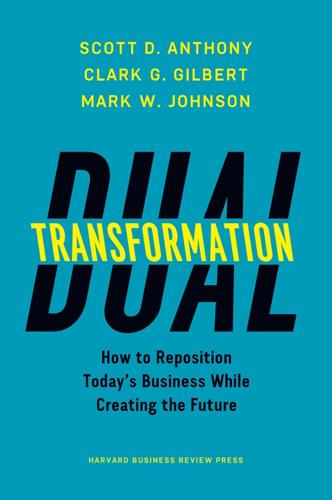
Dual Transformation: How to Reposition Today's Business While Creating the Future
by
Scott D. Anthony
and
Mark W. Johnson
Published 27 Mar 2017
We’re trying to change how Singtel is perceived and also our compensation policies. For example, when we made acquisitions like Amobee and Trustwave in the United States, we created long-term incentive schemes based on Amobee and Trustwave’s own performance rather than Singtel Group LTI [long-term incentive] plans. This was quite a big departure for us. We like the Singtel Group LTI plans because we want Amobee and Trustwave employees to buy into Group objectives. But we recognize that the motivation and connection may not be as strong for them as compared to the rest of our staff.” On Leveraging Scale Capabilities Crow (ASU): “The most significant asset we have is the faculty, and we share that widely.
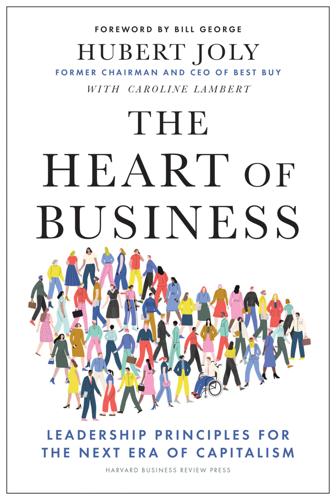
The Heart of Business: Leadership Principles for the Next Era of Capitalism
by
Hubert Joly
Published 14 Jun 2021
Human resources teams around the world spend an inordinate amount of time, resources, and brain power to design and manage such incentive programs. I too believed in the money-as-motivator system for much of my professional life. One of my first decisions as the CEO of Carlson Companies, in 2008, was to help design a long-term incentive plan for senior management, tied to the value we were hoping to create, as a way to mobilize the organization around economic performance. Then in 2015, I came across an animation created around a Daniel Pink presentation on what motivates us.2 Pink cites a study conducted at the Massachusetts Institute of Technology (MIT) that gave various mental puzzles and physical challenges to a group of students.
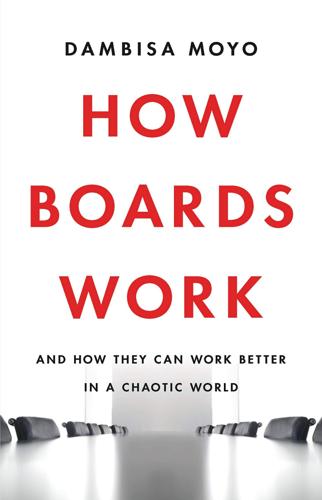
How Boards Work: And How They Can Work Better in a Chaotic World
by
Dambisa Moyo
Published 3 May 2021
Boards face fierce pressure to ensure that pay and performance are properly aligned, and that they steer clear of rewarding poorly performing CEOs with outsize compensation packages, so that pay structures reflect the quarter-by-quarter and year-by-year performance of an enterprise. This can be done through long-term incentive plans and deferred compensation, which ensure that CEO pay is aligned with the long-term interests of the company and discourage CEOs from taking a short-term approach to their role. In this system, CEO compensation is set based on well-defined goals and scorecards reflecting targets based on short-, medium-, and long-term goals.
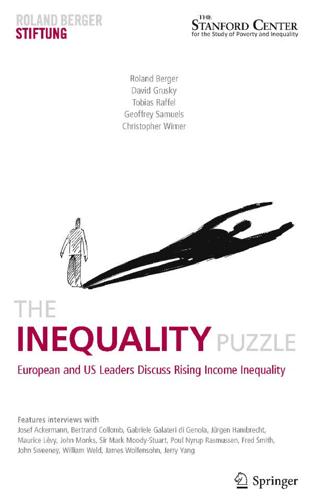
The Inequality Puzzle: European and US Leaders Discuss Rising Income Inequality
by
Roland Berger
,
David Grusky
,
Tobias Raffel
,
Geoffrey Samuels
and
Chris Wimer
Published 29 Oct 2010
I am of the opinion that the years to come will see the return of great values like ethics and the fading away of cynicism. I believe that this would help change behaviors particularly if appropriate didactic communication is applied. The effect on moderation of compensation would be much more important than any regulation. How does Publicis Groupe design its incentive plans? Our long-term incentive plan (LTIP) is based on three-year performance, and it is earned after three years, not year-by-year. So we tell people at the beginning of the plan, we are granting you X stock options or free shares. You will get them based on two criteria: organic growth and profitability. In both cases, compared to the top tier in our business.

Extremely Hardcore: Inside Elon Musk's Twitter
by
Zoë Schiffer
Published 13 Feb 2024
The next day, Twitter published an acquisition FAQ to try to encourage employees to stick around once the deal closed. The document said their employment agreements wouldn’t change for at least twelve months once Musk took over. Their stock would continue to vest and they’d be paid out on schedule. “The terms of the agreement specifically protect Tweep benefits, base salary, and bonus plans (short/long term incentive plans) so that they cannot be negatively impacted for at least one year from the closing date,” it read, according to an employee lawsuit. “In the event of a layoff, any employee whose job is impacted would be eligible for severance.” Elizabeth Bruenig @ebruenig—Apr 14, 2022 if elon musk buys twitter and destroys it, history will have to acknowledge him as a morally complicated figure, capable of great evil but also great good lesbian mothman @verysmallriver—Apr 14, 2022 i was on tumblr when yahoo had to sell it for $3 million after buying it for $1.1 billion. we were all a little bit responsible for losing yahoo a billion dollars. and with that type of collective effort, i believe we here on twitter can lose elon musk even more Dewayne Perkins @DewaynePerkins—Apr 21, 2022 I started playing a game with myself where every time something annoys me on Twitter I immediately get off and force myself to do a Duolingo Spanish lesson, and bitch lemme tell you voy a ser bilingüe en poco tiempo porque todos ustedes son muy molestos Dividend Hero @HeroDividend—Apr 25, 2022 Elon Musk was able to buy Twitter because he doesn’t spend $5 on coffee everyday Ned Miles @nedmiles—Apr 25, 2022 Can someone just tell me if I’m rich or fired please Brooks Otterlake @i_zzzzzz—Apr 25, 2022 I hope a weird guy doesn’t buy Email Brittany Van Horne @_brittanyv—Apr 26, 2022 If we want to raise the money to buy twitter back and put it in the hands of the people, we’re going to have to put on the greatest talent show this town’s ever seen CHAPTER 11 “Let’s See What This Guy Can Do” JP Doherty was on a surf trip in Southern California when he learned Elon Musk was buying the company.
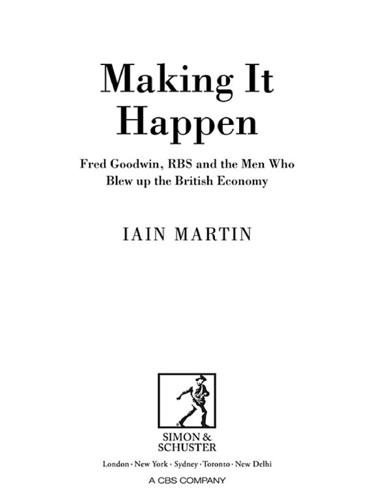
Making It Happen: Fred Goodwin, RBS and the Men Who Blew Up the British Economy
by
Iain Martin
Published 11 Sep 2013
In 2002 his pay packet was up 50 per cent on the previous year to £3.35m, including £2.66m in ‘performance bonus’.5 This package was much bigger than that enjoyed by Goodwin, who was on a total of £2.58m. Fish had also negotiated several performance-related arrangements. The unfortunately named ‘Phantom 2000 plan’ and the Citizens Long-Term incentive plan netted him many millions. ‘Larry roped and doped Mathewson and then he did the same to Fred for many years,’ says a colleague of both. Fish’s timing was perfect. The faster Citizens grew its income and the bigger it became the more money he had a chance of making. As Goodwin stormed through the integration of NatWest, the Royal Bank chief executive was eager to do more deals that would fuel expansion.
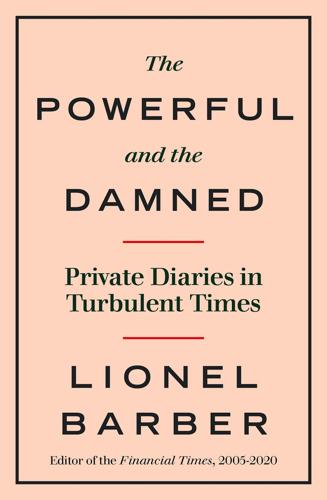
The Powerful and the Damned: Private Diaries in Turbulent Times
by
Lionel Barber
Published 5 Nov 2020
Then there is the personal question: I’ve known Martin for 20 years, swapped regular gossip and socialised with him (and his wife Lady Sorrell, an accomplished businesswoman in her own right and a long-time media contact at the World Economic Forum in Davos). Hell, I’ve even done him the odd favour, seeing a client or appearing at a conference as a guest speaker. How bad do I feel about exposing his alleged indiscretions? Not too bad. After all, Sorrell’s pay package was £70m in 2015 and £48m in 2016 based on a long-term incentive plan related to five-year share price performance.fn11 Investors are entitled to know exactly why he resigned. We must report the story, but I insist that we give Sorrell credit for what he built at WPP, until recently a great British success story in which he played an indispensable role. Shortly before the expiry of our deadline on answering questions about his treatment of staff and the Shepherd Market incident, Sorrell calls me on my mobile phone.
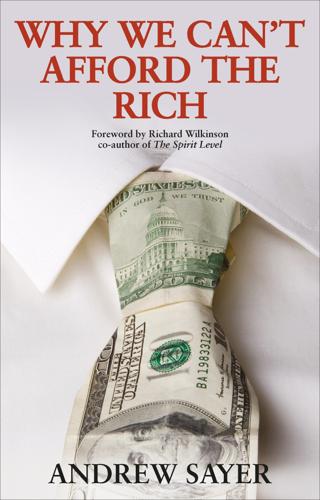
Why We Can't Afford the Rich
by
Andrew Sayer
Published 6 Nov 2014
Tabb argues that in the US stock options have shifted ownership towards CEOs relative to outside shareholders. 97 Tabb (2012), p 44. 98 Tabb (2012), p 47. 99 Tabb (2012), p 50. 100 This was confirmed in a survey reported by Deborah Hargreaves of the High Pay Centre, http://www.highpaycentre.org/blog/it-is-obscene-for-bosses-to-continue-to-take-big-bonuses, 24 September 2012. 101 The Guardian (2012) ‘Executive pay up 27% despite backlash’, 6 November, http://www.theguardian.com/business/2012/nov/06/executive-pay-up-27-percent. In practice, the difference between long-term incentive plans and bonuses for short-term performance is smaller than the name would suggest. 102 Krugman, P. (2012) End this depression now!, New York: W.W. Norton, Ertürk, I. et al (2006) ‘Agency, the romance of management pay and an alternative explanation’, CRESC Working Paper No 23. 103 Bowman, A., Ertürk, I., Froud, J., Johal, S., Moran, M., Law, J., Leaver, A. and Williams, K. (2012) ‘Scapegoats aren’t enough: a Leveson for the banks?’
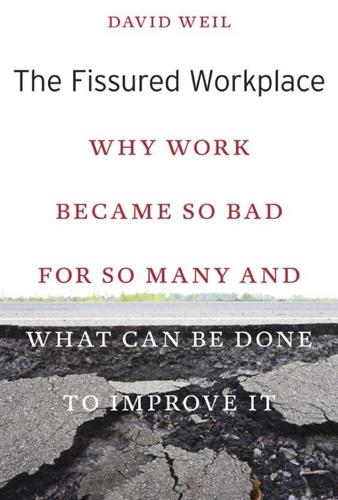
The Fissured Workplace
by
David Weil
Published 17 Feb 2014
However, in the 1980s, compensation in the form of salary and bonuses fell to 74%, dropping further, to 53% of compensation, in the 1990s. By the time stocks, options, and compensation peaked in the period between 2000 and 2005, top CEOs earned only 40% of their compensation from salary and bonuses, while 23% came from stocks and long-term incentive plans (largely restricted stock) and 37% from options.21 As academic studies and news exposés revealed, while rewards did accompany upside results, executives also seemed to be well compensated even when stock prices went in the wrong direction (sometimes drastically so). One reason is that performance-based compensation policies (and the academic literature that justified them) generally assume an “arm’s-length model of bargaining” between the CEO and top executives on one hand and the board of directors on the other in setting up incentive schemes.
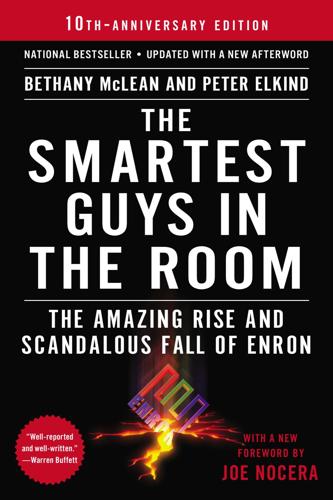
The Smartest Guys in the Room
by
Bethany McLean
Published 25 Nov 2013
It was spending a fortune on EES and broadband and seeding an assortment of Skilling’s other new ventures. And trading was having a mixed year. There was so much at stake. Enron’s shares were climbing again—they rose 55 percent in 1999—and salaries and bonuses were soaring. Every high-level Enron executive held options worth millions. There was even a long-term incentive plan to provide yet another payoff built on Enron’s share price: if the company’s stock performance between 1997 and 2001 ranked among the top six companies in the Standard & Poor’s index, everyone in upper management would get a special cash bonus. So as Enron headed into December and as the company’s finance executives realized the company was still short of its earnings targets, it undertook two deals that were egregious even by Enron’s standards.